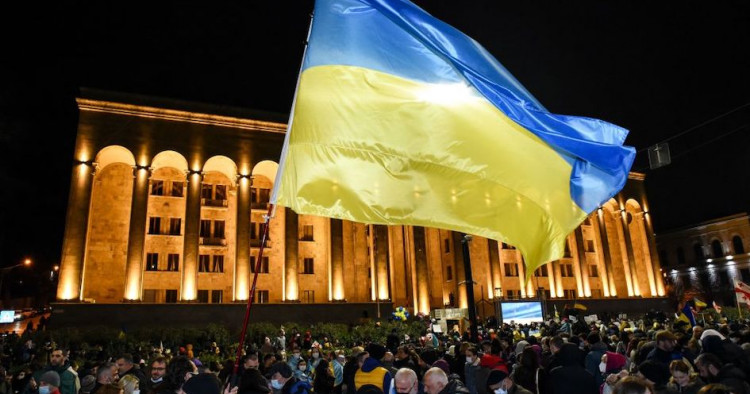Contents:
- In the face of Russian aggression, Ukrainians are standing up for freedom
- The divided regional response to Russia’s invasion
- Russia’s invasion of Ukraine: Impacts on energy markets and regional energy exporters
- The profound impact of Russia’s invasion on Syria
- When your partners go to war
- Israel opts for strategic selfishness
- As Europe burns, the Gulf states hide under the table
- Iran’s response to the Ukraine crisis highlights internal divides
- Ukraine and the ill-advised Moscow visit of Pakistan’s prime minister
In the face of Russian aggression, Ukrainians are standing up for freedom
Iulia-Sabina Joja
Director, Frontier Europe Initiative; Project Director, Afghanistan Watch

Russia’s invasion of Ukraine has captured the world’s attention over the past few days. Ukrainians, led by President Volodymyr Zelenskyy, have given the world a most important lesson: They are fighting an aggressive nuclear power with immeasurable bravery. They are standing up for freedom in a way almost no one expected them to do. The only ones that are not surprised either by Ukraine’s bravery or Russia’s criminal actions are the Eastern Europeans. They have the historic memory, in both the distant and more recent past, of Russian aggression against small nations with freedom-aspiring peoples.
The big surprise, however, is the European Union (EU). We have never seen Europeans so united. In the past few days they have imposed devastating sanctions, crippling the Russian economy with immediate effect. They are doing the same against Belarus, Russia’s ally. The EU has closed its airspace to Russian aircraft. Most importantly, in an unprecedent move, the EU has decided to deliver urgently needed weapons to Ukraine. More is needed, but more will come. On Sunday, European Commission President Ursula von der Leyen stated, “Ukraine is one of us and we want them in the EU,” pushing for Ukraine’s request to obtain candidate status. In the meantime, we are watching the regime of Vladimir Putin bomb civilians while pretending to engage in peace talks.
For the countries around the Black Sea, their responses to the horrific actions of Putin’s regime have been uneven. In Russia and Belarus itself, brave people are protesting their governments’ actions. Mass protests demanding sanctions against Russia took place in Georgia. Perhaps the most complicated role is played by Turkey, a NATO member that has delivered weapons to Ukraine when many Western countries wouldn’t. Ankara has given into Ukrainian pressure to apply the Montreux Convention and deny access to Russian warships to the Black Sea, but it can only do so for Russian ships that don’t belong to the Black Sea fleet. Turkey has yet to impose sanctions on Russia, however.
Turkey’s hesitancy in the face of Russian atrocities is reflective of that of many other countries in the Middle East and beyond. The decision facing Arab countries, as MEI President Paul Salem put it, is about supporting a rules-based world order that prohibits the takeover of other countries by force. This is applicable for the rest of the world as well. The Black Sea region has once again become the world’s hotspot, entirely as a result of Russian aggression. Russia has been bombing and attacking the country for five days, but Ukraine is holding its ground. Russia has also finally launched “the hour of Europe.” The world must decide whether it stands with Ukraine.
Follow on Twitter: @IuliJo
The divided regional response to Russia’s invasion
Randa Slim
Senior Fellow and Director of Conflict Resolution and Track II Dialogues Program

Arab governments are divided into three camps over the Russian invasion of Ukraine: the pro-Russia camp, which unsurprisingly includes Syria, that was quick to recognize the independence of the two breakaway separatist areas in eastern Ukraine and expressed readiness to join Russia’s fight; the anti-invasion camp, which includes Lebanon and Kuwait; and the fence-sitters, which include the regional powerhouses Saudi Arabia, the United Arab Emirates (UAE), and Egypt.
The Feb. 28 statement from the Arab League reflects the fence-sitters’ position: It does not mention Russia, refers to the invasion as a “crisis,” and calls for a diplomatic solution.
Lebanon and Kuwait, two countries that have been invaded by their neighbors in the recent past, staked out a different public position than the rest of the region. Lebanon is the only Arab country to issue a statement condemning Russia’s invasion of Ukraine, in reaction to which the Russian ambassador in Beirut warned the Lebanese authorities at a press conference this past Sunday that “we always look at who stands with us and who stands against us in difficult times.”
For its part, Kuwait was the only Arab country on a list of more than 80 nations to co-sponsor a U.N. Security Council resolution to hold Russia accountable for its aggression against Ukraine.
The UAE, the only Arab country to hold a temporary seat on the U.N. Security Council, abstained twice on votes at the Council — on Feb. 25 to hold Russia accountable for its aggression against Ukraine and demand Moscow withdraw its troops, and again on Feb. 27 to hold an emergency session of the General Assembly to discuss the situation in Ukraine. This stance came after the Russian foreign ministry had already announced that the UAE and Russian foreign ministers will meet on Feb, 28 to discuss expanding relations between the two countries.
Politics, personalities, and economics drive the fence-sitters’ political calculus. To them, maintaining an equidistant relationship between the U.S. and Russia is the default option when their relations with the U.S., especially the UAE, Saudi Arabia, and Egypt, have not been at their best lately due to differences over arms deals, the conflict in Yemen, negotiations with Iran, and rights issues, as well as their need to expand ties with Russia in anticipation of a U.S. withdrawal from the region. Personal relations between Arab Gulf leaders and the Russian president are also a factor here. On the economics side, maintaining their OPEC+ alliance, which Saudi Arabia co-leads with Russia, is key to the economic recovery in oil-producing countries. Other Arab states like Egypt, Algeria, Morocco, and Tunisia that rely on wheat imports from both Russia and Ukraine see a neutral position in the conflict as the best way of minimizing the impact on their food security.
Moreover, there are no domestic political costs for the fence-sitters. There are no large protests in Arab capitals denouncing the Russian invasion. This is partly driven by war fatigue and fears of the implications of the conflict for regional security. And partly it is driven by the prevailing perception in the region that the West has double standards when it comes to Arab lives and Arab lands — a point driven home by the stark difference in how European countries are welcoming Ukrainian refugees compared to how most of them treated Syrian refugees. The Western indignation over Russia’s occupation of Ukrainian lands is also a painful reminder to Arabs of European inaction and U.S. support of the decades-long Israeli occupation of Palestine.
Follow on Twitter: @rmslim
Russia’s invasion of Ukraine: Impacts on energy markets and regional energy exporters
Karen E. Young
Senior Fellow and Director of Program on Economics and Energy

Energy markets have been roiled by spikes in both oil and gas prices and a surge of instability related to the Russian invasion of Ukraine. For the most part, the immediate risk is to Western Europe in terms of energy supply, but Russian gas continues to flow through Ukraine to Europe and Russian oil exports have not been a target of U.S. and European sanctions. However, Russian oil and gas companies have been adversely affected in terms of their share values and should see some hesitance from their investors and international partners in any planned projects or capital investments. Most dramatically, BP has announced plans to divest its stake in Russian state-owned oil producer Rosneft. Germany and Italy are most exposed as they import almost half of their gas supplies from Russia, but a spike in wholesale gas prices affects all consumers. Gas is a core input for much of Europe's electricity generation and a price hike could spur an economic contraction that would not be limited to the continent. Overall price inflation is a worry globally, not caused by the Russian invasion, but now exacerbated by it and the contagion in energy prices.
Direct trade relations with Russia in Europe and the Middle East are limited, with the exception of a few products. The Gulf is better insulated from trade disruption than other MENA states. Russia accounted for less than 1% of the UAE's non-oil exports last year and just 1.5% of its imports. Trade ties with Saudi Arabia, the region's largest economy, were as modest. Most important is Russian (and Ukrainian) export of wheat, as well as some commodities like palladium.
Combined, Russia and Ukraine supply around a quarter of the world's wheat exports, about 20% of the world's corn, and 80% of global sunflower oil exports. Further threatening global food supply chains is Russia's export of ammonium nitrate, a fertilizer. An estimated 70% of Russia's wheat exports went to the Middle East and Africa in 2021.
What will this mean for Gulf and Middle East oil and gas exporters?
In the short term, Gulf oil and gas exporters are poised to benefit from higher export revenues. And not just in oil and gas: The Gulf Cooperation Council (GCC) states are important exporters of global aluminum and fertilizers as well, and the surge in prices will boost their non-oil export revenues this year. However, the pressure of price inflation, especially in food, will be a burden across the MENA region and the Gulf states will be an expected source of financial support for others. At current production levels, a $100 per barrel oil price provides a significant boost to GCC oil export revenues, so much that analysts expect there would be no budget deficits among the six member states in 2022 if this price holds.
The big question is how Gulf oil and gas exporters might seek to gain market share from Russia and act as a source of energy supply stability for Europe. It is both a commercial decision and a political one. In the short term, there is no simple fix. Qatar is exporting liquefied natural gas close to its capacity and Saudi Arabia has been reticent to break its OPEC+ agreement, in place since late 2016, and drastically expand production. However, Saudi Arabia bested Russia in a fight for market share at the start of the pandemic in spring 2020, ramping up production and driving prices down. There is a chance it could take advantage of the moment, especially if Russian exports were challenged by more financial sanctions that targeted the oil sector or the mechanism banks use to accept payment for its trade.
Outside of the energy sector, Russia is the third-largest source of visiting tourists to Dubai, behind India and Saudi Arabia. Travel restrictions and downward pressure on the Russian currency, along with individual sanctions and sanctions on Russian banks and firms, could have an impact on the region's property and hospitality sector. Conversely, the conflict could also encourage some financial transfers and efforts to conceal assets in the Gulf.
Follow on Twitter: @ProfessorKaren
The profound impact of Russia’s invasion on Syria
Charles Lister
Senior Fellow, Director of Syria and Countering Terrorism & Extremism programs

Russia’s invasion of Ukraine looks set to have a profound impact on Syria and Syria policy. For starters, the United Nations-led political process may well now have been dealt a fatal blow. For months in 2021, U.N. Special Envoy Geir Pedersen had been preparing the ground to launch a multilateral “step-for-step” diplomatic effort in 2022. Its prospects for success were always slim, but it looks like a pipe dream now.
One acute concern looking ahead is the threat posed to cross-border aid access in northern Syria. In July, U.N. Security Council Resolution 2585 — permitting U.N.-facilitated aid access into northwestern Syria via Turkey — is up for renewal and the chances of a Russian veto have never been greater. That would precipitate a crippling humanitarian crisis for millions of civilians existentially dependent on aid and assistance.
Another humanitarian crisis could also result if, as seems likely, Russian wheat supplies to Syria are far reduced or cut altogether as a result of war in Ukraine. Successive, severe droughts have debilitated Syrian domestic wheat crops, making the country ever more dependent on Russian assistance. A famine was feared already, but the prospect for one appears even more likely today.
On the security level, U.S.-Russian deconfliction may also be challenged by a deterioration of diplomatic and military ties. 2021 saw a marked reduction in incidents of brinkmanship between Russian and American troops in Syria’s northeast and continued, unchallenged U.S. air access for counterterrorism strikes in the northwest. It is highly likely that Russian forces will soon begin challenging deconfliction lines and blocking roads and U.S. convoys in the northeast, while possibly interfering with drone and reconnaissance flights over the northwest. Russia’s Hemeimeem airbase in Latakia will almost certainly become an even greater source of Russian force projection in the wider region.
Finally, a wildcard in terms of consequence is whether Turkey-Russia relations will be challenged by the war in Ukraine. Ankara has now legally defined the conflict there as a “war” and shuttered the Bosphorus and Dardanelles to all military vessels, including to Russia’s Navy — a move that could have a serious strategic impact on Russia’s naval and air force readiness vis-à-vis Syria. For Turkey, cross-border access into Syria’s northwest is an issue of deep concern, as is Russia’s stance toward the security dynamic across northern Syria, so there might yet be space for a broader quid pro quo arrangement that avoids deteriorating ties. But if they were to worsen, the situation across northern Syria would become extremely fragile.
Follow on Twitter: @Charles_Lister
When your partners go to war
Gönül Tol
Director of Turkey Program and Senior Fellow, Frontier Europe Initiative

President Recep Tayyip Erdoğan faces Turkey’s worst economic crisis in almost two decades, leading to growing discontent among even his own allies. The country’s economic woes are hurting him in the polls, with more Turks now saying that the opposition bloc is better suited to addressing the economic turmoil. Erdoğan’s dimming fortunes have forced him to recalibrate his unilateral, aggressive, and reckless foreign policy stance. From Israel to Egypt, the Gulf states to Western capitals, Ankara is now trying to mend ties. Turkey’s new approach to foreign affairs is most visible in the balancing act it has pursued in the conflict between Russia and Ukraine.
Ankara criticized Moscow’s decision to recognize two breakaway regions in eastern Ukraine as independent, but unlike Western countries it refrained from announcing any punitive action against Russia. Turkey abstained from voting on Russia’s suspension from the Council of Europe and called for dialogue. President Erdoğan said that Turkey could not give up on either Russia or Ukraine as both are close partners. Russia supplies nearly half of Turkey’s natural gas and two-thirds of its wheat imports, is building its first nuclear power plant, and works closely with Turkey in Syria. Erdoğan has pinned his hopes on a revival in tourism revenue, especially from Russian tourists, ahead of the 2023 elections. But Ukraine is also a close Turkish partner. It is not only a market for Turkey’s defense products, but also central to Erdoğan’s efforts to mitigate the negative repercussions of U.S. sanctions on its defense industry, especially in areas where they have created bottlenecks, like engine technology. These considerations have pushed Ankara to pursue a delicate balance between Ukraine and Russia.
A recent announcement by Turkey’s foreign minister to recognize the Russian attack against Ukraine as a “state of war” made many think that Ankara was preparing to take a more decisive step against Moscow. This legal distinction allows Turkey to potentially prevent Russian warships from entering the Black Sea through the Bosporus and Dardanelles straits under the 1936 Montreux Convention, which grants Turkey exclusive control over the waterways into and out of the Black Sea. Indeed, the Turkish announcement is the strongest reaction against Russian aggression since its 2008 invasion of Georgia. In previous instances, Ankara went the extra mile to accommodate Moscow, but this time it’s using stronger language. Calling Russia’s invasion of Ukraine a “war” is a dramatic ramping up of Ankara’s rhetoric, but what might follow remains a largely symbolic gesture that is unlikely to change the military balance of the conflict.
With the exception of several warships operating in the Mediterranean, much of Russia’s fleet is already in the Black Sea. Turkey might prevent Russia from sending additional ships from somewhere else, but it cannot ask those already in the Black Sea to leave, nor can it prevent Russian warships in the Black Sea from passing through the straits if they are returning to base, a point made clear by Turkish foreign minister.
Erdoğan’s recent move is a wise one meant to mend ties with the West while avoiding a significant rift with Moscow. It signals to the West that Ankara is a NATO member willing to act with the alliance at a time of unity against Russia. Ankara has long sought to use the Ukraine crisis to make its case to Washington that denying it the F-35 or F-16s will hurt NATO. Ankara must be hoping that its recent announcement will help that effort. At the same time, since a potential Turkish ban on Russian warships is not likely to radically alter the military balance, Ankara is likely also hoping to avoid Russian retaliation. If the war drags on longer, however, it may become increasing difficult for Ankara to maintain this delicate balancing act.
Follow on Twitter: @gonultol
Israel opts for strategic selfishness
Eran Etzion
Non-Resident Scholar

All Israeli prime ministers sing the same song when they come to Washington: “We are joined by not only strategic interests, but democratic and Judeo-Christian values. Israel is the only democracy in the Middle East, and is the most stable U.S. ally in the region.” If this were really the case, Israel’s current multi-party government should have had no qualms before quickly aligning itself with the U.S. and the global democratic bloc in opposing Russia’s invasion of Ukraine. But as it turns out, Israel is agonizing, deliberating, and even turning its back on its ultra-ally. Israeli Cabinet ministers are whispering to reporters that “we must maintain our operational freedom to maneuver over Syria’s skies,” which hinges on Russian President Vladimir Putin’s “good will.” They have even tried to manufacture a “neutrality” card and proposed to play a mediating role between Russia and Ukraine, an offer that must be particularly amusing to Putin, who sees Israel for what it is — a U.S. ally dependent on generous U.S. military assistance and practically carte-blanche diplomatic cover.
The so-called “government of change” that replaced Benjamin Netanyahu’s 16-year rule (12 of which were consecutive) over Israel chose to continue his policies across the board. Netanyahu distanced himself from the EU and the Democratic side of U.S. politics, and leaned toward Donald Trump, Putin, Chinese President Xi Jinping, Brazilian President Jair Bolsonaro, and Hungarian Prime Minister Viktor Orban, mixing strategy with politics. That might have made sense in the multi-polar world before 2/22, but it is now badly offsides. It’s a new world and a new world order. Israel’s present and future belong with the liberal-democratic side of the old-new geopolitical schism. While hardly anyone preaches for alignment with Russia, China, Iran, and Syria, many call for hunkering down and maintaining radio silence, arguing that “it’s not our war to fight.” Interestingly, almost all of these politicians and commentators are right-wing nationalists that never miss an opportunity to call out the “international community’s hypocrisy and silence in the face of atrocities” committed against Jews or Israelis. This strategic selfishness might seem calculated, a path of least resistance, but it has already exposed Israel to harsh criticism, and if not corrected will place it on the wrong side of history.
Follow on Twitter: @eranetzion
As Europe burns, the Gulf states hide under the table
Gerald M. Feierstein
Senior Vice President

The outbreak of conflict between Russia and Ukraine has placed the Gulf Cooperation Council (GCC) states in the very position they most wanted to avoid: being pressured to choose sides between their historic partnership with the U.S. and their growing economic and political ties to Russia. Thus far, they have maintained a low profile, remaining silent and expressing hope for a diplomatic solution to the crisis. None of the individual governments has issued statements condemning the invasion. The six member states stood behind a statement issued by the Saudi representative to the U.N. General Assembly noting that the GCC states “are following with concern the developments of the current events in Ukraine, and affirm their support for all efforts aimed at resolving the crisis through dialogue and diplomacy.” For the most part, the six see the crisis as primarily engaging the interests of the U.S., EU, and NATO, allowing them to remain safely on the sidelines. The one exception was Qatar, which was in telephone contact with both the Russian and Ukrainian governments.
The one GCC government that will not be able to maintain a low profile is the UAE, which, perhaps to its regret, began its two-year term as a non-permanent member of the U.N. Security Council on Jan. 1. Thus far, the Emiratis have abstained on the two votes that have come before the Council on the Ukraine situation, the first demanding a halt to the Russian invasion and the second, a procedural motion to refer the issue to the General Assembly. Although the Emirati votes did not affect the outcome of the Council debate in either instance, Abu Dhabi’s reluctance to take a clear position on the Russian aggression is likely to become both more apparent and more awkward as the crisis continues. The Emiratis are also exposed because Dubai is a major financial and commercial hub for Russian businesses and will, therefore, be expected to follow the U.S. and European sanctions regimes that are being put in place. Anything less than full commitment to supporting the international efforts to sanction the Russians is almost certain to be noticed in Western capitals.
Indeed, all of the GCC states, especially Saudi Arabia, are likely to come under increasing pressure to join international condemnation of Russian aggression as the crisis goes on. Having repeatedly asserted that they would not be drawn into taking sides in U.S. strategic competition with China or Russia, the current crisis is perhaps a useful teaching moment for the GCC states that such an “above the fray” posture is not sustainable once the stakes gets real.
Iran’s response to the Ukraine crisis highlights internal divides
Alex Vatanka
Director of Iran Program and Senior Fellow, Frontier Europe Initiative

Iranian views on Russia’s invasion of Ukraine are split along typical lines. The majority of the Iranian public, as well as moderate voices inside the Tehran regime, deplores Moscow’s military attack on Ukraine and laments Tehran’s official stance, viewing it as a reflection of subordination to Russia. In contrast, the hardline camp, which controls all levers of power, feigns neutrality but has in effect condoned Russia’s actions. This split reflects a far more significant debate, which is about whether ideological preferences or national interest should dictate Tehran’s foreign policy decisions.
The ideology-heavy messaging from President Ebrahim Raisi is that Iran is “opposed to both war and to domination.” This is a reference to Russian fears about NATO’s eastward expansion since the collapse of the Soviet Union. The tortured logic at play here is that Russia holding back NATO directly benefits Iranian national interests. Never mind that NATO has bordered Iran since 1952, when Turkey became a member. This sort of argument by the hardline camp is a poor excuse for its inability to formulate a “balanced foreign policy,” a motto of the Raisi government. Instead, this faction echoes Russian talking points.
The three pillars of power in Tehran — the Office of the Supreme Leader, the Presidency, and the Revolutionary Guards — see the Ukraine crisis as a litmus test. Failure to satisfy Moscow could spell the loss of Russia’s support, which Iran considers indispensable to facing off against Western pressures. To some extent such fears might be reasonable. For example, Moscow could adopt a less sympathetic stance toward Iran at the ongoing nuclear talks in Vienna. Any hint of Iranian disapproval of Russia’s invasion of Ukraine might also negatively impact Iranian-Russian cooperation in trade, investment, and (particularly in Syria) security, as well as joint efforts (together with China) to undermine Western policies such as sanctions.
A balanced Iranian foreign policy would have belied the importance that Tehran attaches to Russian sensitivities. For example, Tehran could have maneuvered its way into supplying natural gas and oil to Europe at a time when the Europeans are questioning their dependence on Russian energy. Iran, after all, has the second largest gas reserves in the world after Russia. But the firebrand hardliners in Tehran, paying homage to Russia, would not even dare raise this possibility. The Ukraine crisis is merely the latest example of the hardline ruling elite in Tehran putting their own narrow factional interests above those of Iran.
Follow on Twitter: @AlexVatanka
Ukraine and the ill-advised Moscow visit of Pakistan’s prime minister
Marvin G. Weinbaum
Director, Afghanistan and Pakistan Studies

As the war drums surrounding Ukraine grew louder last week, Pakistan’s Prime Minister Imran Khan landed in Moscow with a high-level delegation. On Thursday, with the invasion of Ukraine in full swing, Khan sat down with Russian President Vladimir Putin for a meeting that was expected to last less than an hour but went on for three. At the top of Pakistan’s agenda was discussion of the long-stalled construction of a $2.5 billion Russian southern gas pipeline. For the Kremlin leader, the visit turned out to be perfectly timed to create the appearance of Pakistan’s implicit endorsement of Russia’s military action. Despite past statements by Khan’s government upholding the principle of territorial integrity, there is no indication that he used the meeting to question Russia’s invasion. Nor did Khan in a subsequently publicized interview express anything more than his hope that the crisis could be resolved peacefully. If anything, the optics during the trip left the impression that he approves of the invasion. With great ceremony, Khan laid a wreath — as Putin had done two days earlier — at a memorial to Russia’s unknown soldier.
Some observers see Pakistan as drifting toward membership in a new strategic alignment headed by Russia and China. Khan has frequently repeated his objection to having Pakistan side with any power bloc. Yet Pakistan’s relations with Russia have visibly warmed in recent years, not incidentally along with a growing convergence of Chinese and Russian foreign policies and a chilling of U.S.-Pakistan relations. While China has been described as midwifing broadened ties between Islamabad and Moscow, Washington has distanced itself from Pakistan by insisting on a narrow relationship focused primarily on Afghanistan and countering terrorism. Together with the belief in Pakistan that the U. S. has wholeheartedly thrown in its lot with India, the country has felt particularly disrespected by President Joe Biden’s unwillingness to give Khan the courtesy of a phone call. For its part, Russia seems to believe that it can cultivate relations with Pakistan without damaging its decades-old economic and political partnership with India. India’s refusal thus far to criticize Russia for the attack on Ukraine suggests that New Delhi, while uneasy about Russia’s overtures to Pakistan, is unprepared to give up its close ties with Moscow.
While the Moscow meeting was in process, the U.S. lectured Islamabad on the need for ”every responsible country” to express concern over Russia’s invasion. In turn, Pakistan has sought to portray the visit as a normal exercise in bilateral diplomacy and has downplayed the significance of its timing. In the U.S.’s growing confrontation with Moscow and Beijing, Khan imagines he can carve out a neutral role for Pakistan. But it will be difficult. Even with China’s largesse, Pakistan’s economic and strategic interests are more likely to keep the country closer aligned with the West. A heavily sanctioned Russia, which has never had more than a trickle of trade with Pakistan, has little to offer. In any case, the Ukraine crisis has pushed to the fore seriously clashing strands of Pakistan’s foreign policy.
Malavika Radhakrishnan, research assistant to Marvin G. Weinbaum, assisted with this article
Follow on Twitter: @mgweinbaum
Photo by VANO SHLAMOV/AFP via Getty Images
The Middle East Institute (MEI) is an independent, non-partisan, non-for-profit, educational organization. It does not engage in advocacy and its scholars’ opinions are their own. MEI welcomes financial donations, but retains sole editorial control over its work and its publications reflect only the authors’ views. For a listing of MEI donors, please click here.













